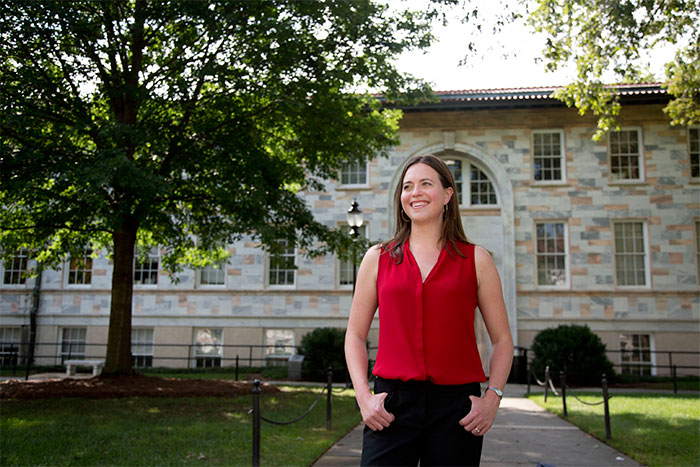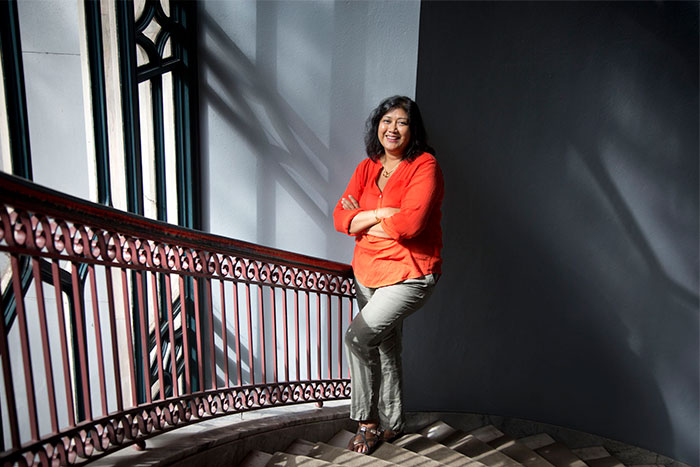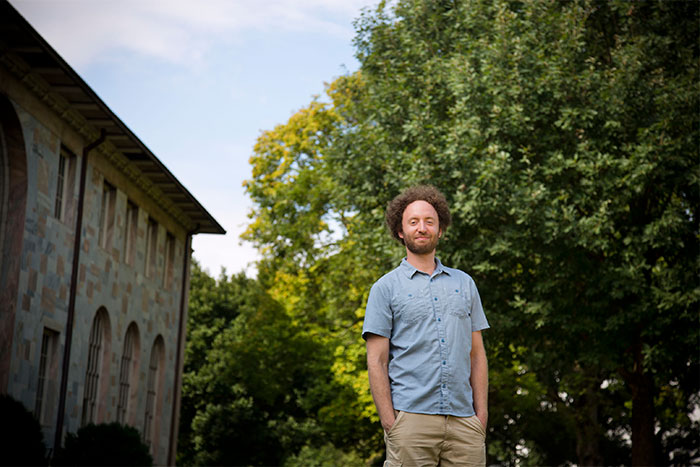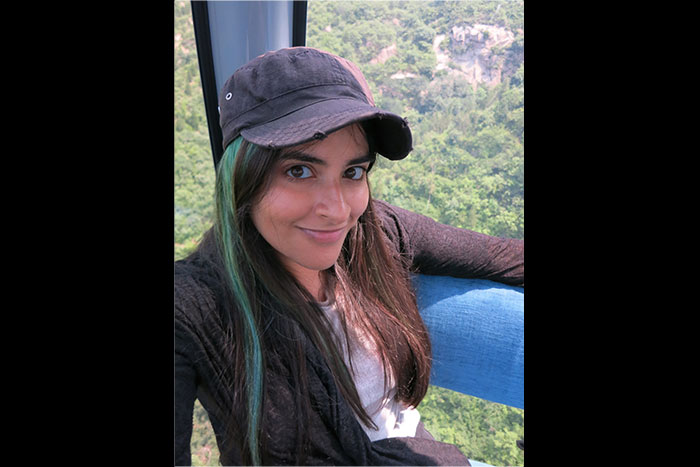From a biology professor with a PhD in physics to an English professor who studies the history of medicine, new Emory faculty members bring a range of scholarly interests and achievements extending far beyond traditional departmental boundaries.
"We are looking for ambitious, creative and highly productive scholars who are working in areas and solving puzzles that reflect the world that we live in today: critical social problems and scientific problems that are often best addressed by crossing conventional disciplinary boundaries and combining a host of methodologies and theories," says Carla Freeman, senior associate dean of faculty for Emory College of Arts and Sciences.
"Almost all of the new faculty we hire today I would describe as interdisciplinary in their interests and approaches," she adds. "In many ways, it is the thrust of contemporary scholarship. The walls of departments and disciplines have become much more permeable, and it is often at the crossroads that the really exciting work is happening."
Freeman, who oversees processes for hiring, tenure and promotion for faculty in the College, brings her own interdisciplinary perspectives: a cultural anthropologist, she is a professor of Women's, Gender and Sexuality Studies, and also an associated faculty member in Anthropology and Latin American and Caribbean Studies.
Emory has a long tradition of interdisciplinarity, she notes, including faculty who are jointly appointed to more than one department, and those who are firmly anchored in one department but pursuing scholarship that is steeped in several fields. The result is both groundbreaking scholarship and engaging learning opportunities for students.
"Interdisciplinarity introduces students to the reality that the kinds of questions we ask, and the approaches we take to answering them, are derived out of particular historical traditions and these shape what we understand evidence and knowledge to be," Freeman says. "The cross fertilization of those different epistemologies makes for a challenging but rich educational experience, and I think our faculty are really good at putting those conversations together."
Embodying Emory's richness
Take, for example, just two of the 32 new faculty members joining Emory College this fall. Daniel Weissman, an assistant professor of physics, studies evolutionary biology. Gordon Berman, an assistant professor of biology, holds a PhD in physics.
"The physics department was actually happy with the fact that I do biology and talk to biologists, and the biology department was very welcoming and didn't mind that my background is in physics," Weissman says, explaining why he came to Emory. "And it's great to have the medical school and the Centers for Disease Control and Prevention right here, too."
Berman also praises Emory's welcoming atmosphere for a broad range of scholarship. "Through all of my interactions so far, I have been consistently struck by the breadth, energy, creativity and kindness of the researchers here," he says. "Emory seems to be a dynamic place to do research, and I'm very much looking forward to jumping into the fray."
Scholarship that blends the humanities and the sciences is similarly embraced at Emory. Sari Altschuler, a new assistant professor of English who studies early American literature and the history of medicine, will also teach in Emory College's Center for the Study of Human Health.
"As a humanities scholar who works on health and disability, Emory is a really special place to work," she says. "The human health program is particularly exciting because it presents an exciting and unique opportunity to work on interdisciplinary issues in human health with scholars from a variety of fields."
For Freeman, the benefits of interdisciplinary teaching and research add up to more than the sum of the parts.
"That is our signature at Emory: the marriage of an intimate liberal arts college where students are closely mentored and have opportunities for independent scholarship, together with a cutting edge research institution," she says. "These new hires are exciting; they are the embodiment of this richness."
Learn about the interdisciplinary interests of a sampling of new Emory College faculty members:
Sari Altschuler
Assistant professor of English
Background: PhD in English from City University of New York; assistant professor, University of South Florida; postdoctoral fellow, American Antiquarian Society
Focus of scholarship: My first book is about the contributions of the imagination and literary form to the production of medical knowledge in the United States, roughly between the American Revolution and the Civil War. I also work on the history, rhetoric and representation of disability in the period.
Why it matters: Today, many people think of STEM and medicine as quite separate fields from the humanities. My research, however, reveals a long history in which the humanities offered important ways of knowing for science and medicine. I am not suggesting we return to past practices but rather that we use this history of medical and humanistic collaboration to understand the historical contingency of current disciplinary models. It can help us imagine new ways of knowing together.
Benefits of interdisciplinary approach: The book I am completing is, fundamentally, about the history of interdisciplinarity — or rather, about interdisciplinarity before the disciplines as we now know them. From a historical perspective, our current disciplinary boundaries are anachronistic; they do not represent the world as the figures I write about would have understood it. So interdisciplinary work is necessary to get a more accurate sense of the past. In the 21st century, interdisciplinarity is important because it insists on the value of multiple ways of knowing. Crossing traditional departmental boundaries forces an individual scholar to consider other ways of knowing alongside the more comfortable habits, practices and epistemologies of her home discipline. It also allows scholars working on similar topics from different perspectives to collaborate and to know more together than they could separately.
Gordon Berman
Assistant professor of biology
Background: PhD in physics from Cornell University; associate research scholar, Princeton University
Focus of scholarship: My research focuses on gaining quantitative insight into entire repertoires of animal behaviors, aiming to make connections to the neurobiology, genetics and evolutionary histories that underlie them. By this, I mean that instead of focusing on one small movement or activity an animal performs, I try to study the intricate interactions between these behaviors and the commonalities and differences that emerge between individuals and species. To this end, I primarily use theoretical, computational and data-driven approaches, applied to a broad range of organisms, including worms, flies, mice and humans. Hopefully this line of inquiry will also guide us towards a better understanding of how this organization fails in many common maladies such as autism or Alzheimer's and Parkinson's diseases.
Why it matters: Compared to the startling advances we've made towards understanding the molecular and cellular building-blocks of living creatures, our understanding of behavior — the ostensible output of these microscopic systems — has lagged considerably. When I started my postdoctoral work, it was this discrepancy that drew me in to this line of research, attempting to see if we can find the theoretical underpinnings that could better explain how genes and neurons relate to animals' movements. What I quickly found, though, is that perhaps the largest reason for our lack of understanding was the fact that we didn't really have a language for quantitatively describing behavior. Thinking about how one should do this has provided the impetus for my research and continues to open new avenues of inquiry and exciting applications of the work. Plus, I get the opportunity to uncover new mathematical and computational tools along the way.
Benefits of interdisciplinary approach: I use many approaches to studying biological systems, like information theory or dimensionality reduction, that were originally developed or are more commonly found in physics or applied mathematics or computer science departments. I also look at biological problems as a physicist, meaning that I tend to look for general explanations that do not necessarily depend on all of the details of a problem and that can be to some extent generalized across systems. This type of approach, performed in combination with the types of system-specific inquiries commonly performed in biology departments, has the potential of generating transformative new insights.
Murray Rudd
Associate professor of environmental sciences
Background: PhD in environmental studies from Wageningen University (Netherlands); center director, Center for Marine Resource Studies, School for Field Studies, Turks and Caicos Islands; assistant professor and Canada Research Chair in ecological economics, Memorial University (Canada); assistant professor and associate professor, environment department, University of York (UK).
Focus of scholarship: My primary focus is on environmental policy, particularly relating to the protection of endangered species and to freshwater and marine ecosystems in general. In the conservation science field, there has been ongoing concern that good science about global biodiversity loss over the last 30 years has done little to stem that loss. Over time, my research has evolved. Whereas much of my work in the past was on the economics of biodiversity loss, it is now much more focused on the science-policy interface, trying to find out ways to increase the impact of natural and social science on real-world conservation outcomes.
Why it matters: We have no shortage of species and ecosystems in crisis. Understanding human behavior, economics, politics and the policy-making process are all central for good environmental management — it is not just about biology and ecology, but requires insights about how to align incentives for people and firms with the longer-term interests of society.
Benefits of interdisciplinary approach: Working on complex environmental problems makes it absolutely necessary to work with colleagues from other academic disciplines and with people from beyond academia — there are simply too many diverse factors for researchers in a single discipline to handle. Part of my current research actually involves building a better understanding of what factors influence successful cross-disciplinary collaboration and predispose
some scientists to collaborate across disciplines. The benefits of academic boundary-crossing are numerous — certainly one is constantly learning about new perspectives and ideas, but there is, I think, also a higher likelihood that such research will actually contribute to real solutions to some very complex challenges.
Meredith Schweig
Assistant professor of ethnomusicology, Department of Music
Background: PhD in ethnomusicology from Harvard University; Mellon Postdoctoral Fellow in the Humanities, Massachusetts Institute of Technology
Focus of scholarship: My scholarship examines popular song, narrative and cultural politics in 20th- and 21st-century East Asia, with a focus on the Chinese-speaking world. I'm currently working on a book about Taiwan's vibrant underground hip-hop scene. It explores how performers have invoked rap as a storytelling practice, to make sound and sense of the sweeping transformations that have accompanied Taiwan's democratization.
Why it matters: I think that part of rap's global appeal is that it's a really excellent way to tell stories. MCs often cultivate public identities as storytellers: they are oral historians, political pundits, chroniclers of everyday struggles and joys. Taiwan has experienced so much upheaval and change in the past century. I wanted to know more about the kinds of stories Taiwan's MCs are telling and how they reflect the island's current social and political realities.
Benefits of interdisciplinary approach: My work on Chinese-language popular music draws on theoretical and conceptual approaches from a range of disciplines, including music theory, anthropology, sociology, political science and performance studies. Music is embedded in complex webs of cultural meaning — to study it from an ethnomusicological perspective necessitates thinking across traditional departmental boundaries.
Falguni Sheth
Associate professor of women's studies
Background: PhD in philosophy, New School for Social Research; associate professor of philosophy and political theory, Hampshire College ; instructor, Department of Philosophy, Middlebury College; multiple visiting and adjunct positions
Focus of scholarship: I write about race and gender in relation to politics, and state-led violence. My research focuses on how vulnerability is translated into racial categories, and vice versa. For example, my last book, "Toward a Political Philosophy of Race" (2009, SUNY) considers how racial divisions preserve state power. One of my current book projects is on interstitiality, which is a rethinking of how group antagonisms and alliances emerge. I'm also interested in the demonization and vilification of Muslim populations in the U.S. and globally, especially since Sept. 11, 2001.
Why it matters: Concerns of vulnerable populations should be important to everyone. I have an opportunity to research and weigh in on these issues through my work.
Benefits of interdisciplinary approach: Philosophy is the field in which I received my PhD, and it is helpful for critical thinking, and having a sense of how ideas emerge and change across time and geographical spaces. However, no single field can provide all the answers, and as such I turn to a range of other fields that can help advance my work: feminist legal theory, critical race theory, philosophy of race, political philosophy, legal philosophy, history of economic thought, political economy, history and the social sciences generally.
Daniel Weissman
Assistant professor of physics
Background: PhD in physics, Stanford University; postdoc and Simons Research Fellow, University of California, Berkeley; postdoc, IST Austria
Focus of scholarship: I am a theoretical physicist working on evolutionary biology. I try to learn the history of populations and predict how they will evolve in the future, using the information in their genomes.
Why it matters: We need to understand evolution quantitatively to prevent bacteria from becoming resistant to antibiotics, to develop effective vaccines against viruses, and to breed better crops and livestock. It's a very exciting field for a theorist to be in, because there is a flood of genomic data coming in, allowing us to ask questions that would have seemed ludicrously ambitious even a few years ago.
Benefits of interdisciplinary approach: As a physicist working in biology, I have a complementary set of knowledge and approaches to my biologist colleagues. Looking at the same population, we will notice different things and come up with different questions, so when we talk to each other and work together we can do much more than we can individually.
Avani Wildani
Assistant professor of math and computer science
Background: PhD in computer science, University of California; postdoctoral fellow, The Salk Institute of Biological Studie
Focus of scholarship: The brain is in many ways like a cluster of computers, all creating and exchanging information at light speed. Although information propagation in the brain is not well understood, we have learned a considerable amount about how to build computer systems that return answers that are correct, consistent and fast. My research focuses on building our knowledge of data management in large systems, and then translating this systems knowledge into a better understanding of how the brain may organize information.
Why it matters: I was drawn to this topic by the notion of "forgetting." Why is information in the brain not as reliable or available as information in the cloud? What does that tell us about how the brain works, and can we fix it? Additionally, the brain manages to solve complex problems using very little energy. If we can learn strategies from the brain, we would be able to design large computer systems that are much more environmentally conscious.
Benefits of interdisciplinary approach: My research sits at the intersection between neuroscience and computer systems. Crossing boundaries allows me to make new connections between the large bodies of knowledge present in both fields, and to postulate questions that are unique to this intersection.






